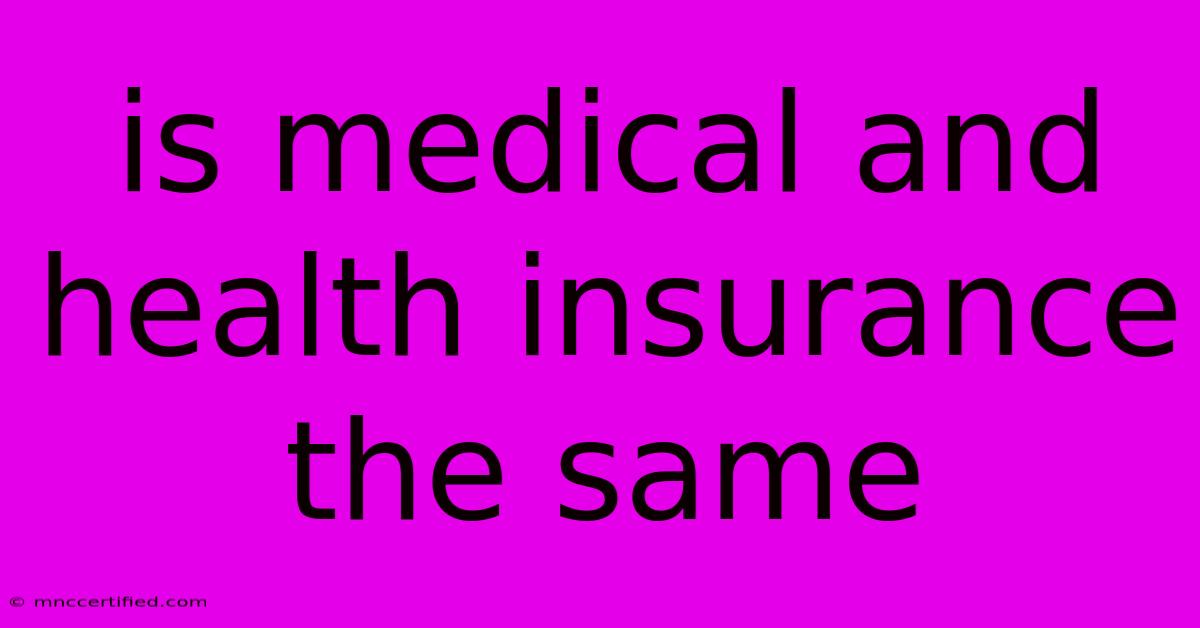Is Medical And Health Insurance The Same

Table of Contents
Is Medical and Health Insurance the Same? A Deep Dive into the Similarities and Differences
When it comes to protecting your well-being and financial security, understanding the nuances of medical and health insurance is crucial. While these terms are often used interchangeably, there are some key distinctions that can significantly impact your coverage and financial responsibility. Let's explore the similarities and differences to gain a clear picture.
The Common Ground: Protecting Your Health
At their core, both medical and health insurance aim to safeguard your financial well-being in the event of unexpected health issues. Both types of insurance provide coverage for:
- Doctor's visits: Consultations, check-ups, and specialist appointments.
- Hospitalization: Inpatient care, surgeries, and emergency room visits.
- Prescription drugs: Coverage for necessary medications prescribed by a doctor.
The Key Differences: Scope and Coverage
While the core purpose is similar, the scope and specific coverage details can differ significantly between medical and health insurance. Here's a breakdown of the main distinctions:
Medical Insurance:
- Focus: Primarily focuses on covering the costs of medical treatment and related expenses.
- Coverage: Typically covers a broader range of medical services, including preventive care, diagnostic tests, and rehabilitation.
- Limitations: May have limited coverage for non-medical expenses, such as dental, vision, or mental health care.
Health Insurance:
- Focus: Encompasses a wider range of health-related services beyond just medical treatment.
- Coverage: Often includes coverage for dental, vision, mental health, and wellness programs alongside medical services.
- Limitations: May have narrower networks of providers and specific limitations on coverage for certain services.
Understanding Your Options: Key Considerations
When choosing the right insurance plan, consider these factors:
- Your individual needs and preferences: If you prioritize comprehensive coverage for all aspects of your health, health insurance might be a better fit.
- Budget: Medical insurance tends to be more affordable, but health insurance may offer more value for your money, depending on your specific needs.
- Provider networks: Ensure the plan you choose includes doctors and hospitals within your preferred network.
- Benefits and exclusions: Carefully review the policy document to understand what is covered and what is not.
Conclusion: Navigating the Insurance Landscape
Both medical and health insurance play vital roles in protecting your health and finances. Understanding the differences, considering your individual needs, and carefully evaluating your options are crucial steps to making an informed decision. By carefully exploring your choices, you can secure the right type of insurance to safeguard your health and peace of mind.

Thank you for visiting our website wich cover about Is Medical And Health Insurance The Same. We hope the information provided has been useful to you. Feel free to contact us if you have any questions or need further assistance. See you next time and dont miss to bookmark.
Featured Posts
-
Draymond Green Phoenix Missing Piece
Nov 08, 2024
-
Aclu Challenges Trump Policies On Abortion Lgbt
Nov 08, 2024
-
Watch Bengals Vs Ravens Todays Game Info
Nov 08, 2024
-
Is Septorhinoplasty Covered By Insurance
Nov 08, 2024
-
Does Renters Insurance Cover Trampolines
Nov 08, 2024